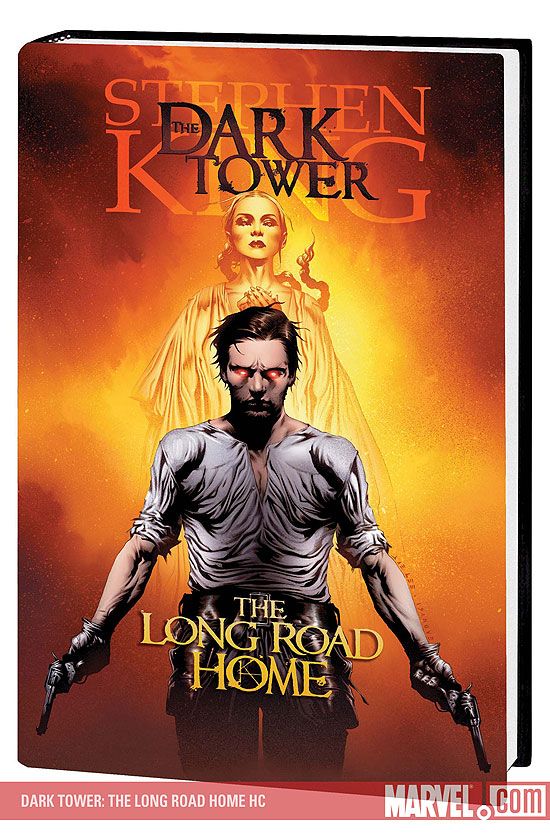I'm no expert on Stephen King's "Dark Tower" mythos. I read the first novel about fifteen years ago, and I thought it was a disaster of sloppy prose, ill-defined characters, and misused archetypes. That pretty much killed my interest in the series which has, in the intervening fifteen years, become something much more culturally important. When I read it, "The Gunslinger" was just the first novel in a seemingly abandoned series, but since that time, "The Dark Tower" has become a kind of a geek high-water mark, spoken of with the reverence once reserved for "The Lord of the Rings" or "Star Trek." But I could never get past my abhorrence for that first book.
So when Marvel began adapting Stephen King's "Dark Tower" saga, I was vaguely interested -- how could I not be intrigued with Jae Lee on the art? -- but after flipping through the first issue of "Gunslinger Born" and seeing Lee's art blurred and airbrushed by Richard Isanove, there was nothing to lure me in. I was maybe a bit curious about how the terrible novel would distill into a compressed comic book, but I passed on buying the single issues.
When I learned that I'd be reviewing the sequel, "The Long Road Home," I decided to pick up the collected edition of "Gunslinger Born" after all. I wanted to rely on more than my fifteen-year-old memory before seeing where Robin Furth and Peter David took their new story. And, you know what, "Gunslinger Born" is almost as bad as I remember "The Gunslinger" being. The diction shifts are abominable, with slang mixed with faux-formal constructions -- and I get that it's a bastardized alternate-reality/distant future version of English, but it didn't work in the novel or the comic book adaptation. The worst sin of "Gunslinger Born" is that it jumps from superficial scene to superficial scene without providing anything resembling a story progression. It's a failure on a narrative level, so much so that its climax is rendered inert because the love between Susan Delgato and Roland Deschain isn't portrayed with the necessary space. We're told that their love is strong and powerful, but, like everything else in "Gunslinger Born," it's just one more surface detail without substance. One more scene to check off on the adaptation list.
"The Long Road Home" picks up where "Gunslinger Born" left off, plot-wise, but it's a drastic improvement in almost every way. First of all, this is Robin Furth's story, with dialogue by Peter David. And although they both worked on the first adaptation, they are on their own here, taking a previously undefined moment in the life of Roland Deshain and fleshing it out into a full five issues. So, here, we don't get the jarring leaps from scene to scene. The writers don't have to cram a novel into a handful of issues. Instead, they can focus on one layered, intense, visually interesting sequence as the heroes journey back home.
Roland's ka-tet, his band of gunslingers, takes center-stage in "The Long Road Home," and since Roland is in an unconscious dream-state throughout much of the story, Alain and Cuthbert are given greater prominence. These are the same characters from the first "Dark Tower" comic, but they are fully developed here. They have room to breathe and emote and talk, and the lack of characterization in "Gunslinger Born" is more than made up for in these chapters.
Jae Lee's art is always fabulous, but Richard Isanove's hazy colors do not complement Lee's stark black-and-white illustrations well at all. Yet the pairing of the two artists works much better in "The Long Road Home" than it does in "Gunslinger Born," largely because this book is a bleak and simple journey, and the landscape reflects that. In the first book, the coloring softened the harsh bits and made the ill-defined setting even less evocative than necessary, but here, as the story alternates between the road and Roland's psychic journey, the art lines up with the themes more perfectly. I still don't think Isanove is the best match for Jae Lee, but I respect his ample contributions here, especially when the wolves appear. Isanove's hues add a menace that Lee's art might not have conveyed quite as powerfully.
Even the captions and dialogue works better here than in the first book, with Peter David seemingly able to shake off many of King's bad habits while retaining some underlying consistency of tone. "Gunslinger Born" had embarrassingly purple prose like, "the green moss beneath the place where her thighs joined turned a pretty red as her virginity passed." This book has nothing even close to that atrocious. Instead, David uses the captions effectively, if not quite sparingly, and keeps the story moving along swiftly.
"The Long Road Home" is an excellent, practically self-contained, tale. I don't know if you can really skip "Gunslinger Born," but I certainly can't recommend that first book to anyone. This one, I can recommend. It's a strange and violent and beautiful little story, full of terrible portents and human struggle. Even if you've been turned off by Stephen King's work before, as I have, I think you'll like what Furth, David, Lee, and Isanove do in this volume. Hell, if the thrill of the journey isn't enough to entice you, I might add that it's even got robots, demons, and mutated wolves. What more could you ask for?

